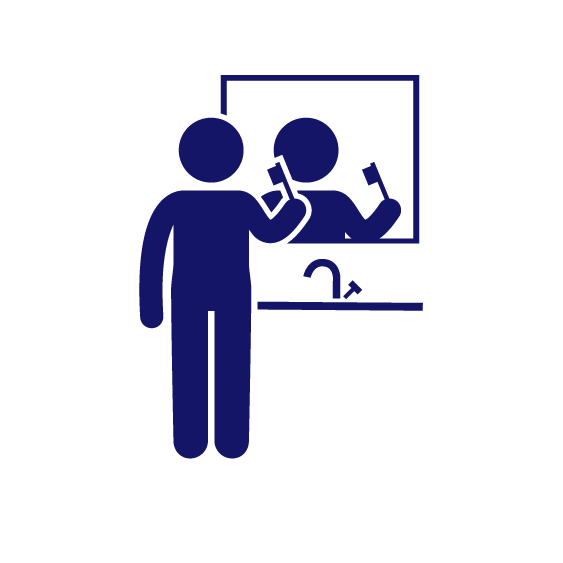Fact check: Lonely guinea pigs and other quirky Swiss rumours

Is that really true? We asked you whether you’d heard anything about Switzerland that sounded suspicious and that you wanted us to check out and clear up. Here are answers to some of the quirkier queries – rumours, urban myths and weird laws.
Questions ranged from pressing issues such as nocturnal neighbourly noises to hidden gold, the consumption of dogs, and road tunnels stuffed with explosives – and perhaps the most common question of them all:
Is it true that it’s not possible in Switzerland to buy just one guinea pig – you have to buy at least two because they get lonely and need company? I hope it’s true because it’s ADORBS. – Vanessa Bradley
It’s possible to do many things in Switzerland, Vanessa, but whether they’re TOTES legal is another matter. You can certainly buy just one guinea pig – it’s not as if they come in multipacks – but “guinea pigs are very social animals and may not be kept on their own”, the Federal Food Safety and Veterinary OfficeExternal link confirms.

More
Keeping pets
The 182-page Animal Protection OrdnanceExternal link, in force since September 2008, has mind-boggling information on how hundreds of species should be kept. Did you know that you’re not allowed to force domestic poultry to wear glasses or contact lenses? (Art. 20 (c).)
The species that “must be kept in groups of at least two animals” are (for mammals) guinea pigs, mice, gerbils, rats, degus and chinchillas, and (for birds) Japanese quails, macaws, cockatoos, parakeets, parrots, canaries, estrildid finches and – of course – lovebirds. Domestic rabbits “may not be kept on their own during their first eight weeks”, after that they should be kept in groups “whenever possible”. If it’s not possible, they must at least be able to hear and smell other rabbits.
The veterinary office has loads of advice (in German, French and Italian) on looking after guinea pigsExternal link and other pets. “An ideal guinea pig group comprises two or three females and a castrated male,” it says. Disputes occur more often among exclusively female groups, apparently.
But what about hamsters? Elena May wrote in, wondering: “Is it true that it’s illegal to own only one hamster in Switzerland?” Well it turns out that “gold hamsters are lonersExternal link and should be kept on their own”. However, the veterinary office says Russian dwarf hamsters and Chinese hamsters can live in family groups.
As for enforcement and punishment, the cantonal veterinary services, which carry out animal protection checks, determine the penalties of non-compliance.
Do they still eat dogs in Appenzell? – Marcin Tkacz
First of all, did they ever eat dogs in Appenzell, a conservative region in northeast Switzerland? Yes. Eating cats and dogs is legal in Switzerland and, as the head of Swiss Animal Protection told swissinfo.ch in 2013, “maybe 100 to 200 people in Switzerland eat dog or cat meat from time to time”. Anecdotally, northeastern Switzerland seems to be a hotspot for this.
A separate issue is whether people eat cat or dog meat unwittingly. The Swiss bureau for lost pets estimates that up to 20,000 pets disappear every year, with around three-quarters being cats.
So do people still (intentionally) eat dogs in Appenzell? Probably, but very rarely.
Is it true that toilets can’t be flushed after 10pm? – Bhargav Bhatt
Ah, the one that just won’t go away, as it were. In another version of this popular urban myth men aren’t allowed to pee standing up after 10pm (because it might disturb the neighbours below). Is any of it true? No.
“If tenants feel disturbed or are even woken up by the noise of peeing or flushing, they’ve just got to live with it,” Ruedi Spöndlin, a legal adviser at the Swiss Tenants’ AssociationExternal link, said in an advice column for newspaper 20MinutenExternal link in 2017.
He said he was once asked by an embarrassed tenant whether she could forbid her neighbour from going to the loo at night. “We obviously had to tell her that was a non-starter.”
Occasionally people complain about neighbours moving furniture in the middle of the night – which is not allowed. “But with claims like this it often turns out that the neighbour has simply got up from their chair a couple of times,” Spöndlin said.
But it’s not as if anything goes in the small hours. “Room volume” is the general rule. “That means you can talk and listen to music that can be heard only in the same room.” On a balcony, room volume becomes “table volume”.
Pianos are frequently the subject of complaints to the advice centre. “Playing an instrument for two or three hours a day is perfectly acceptable,” Spöndlin said. “But people shouldn’t practise very loud instruments such as drums or trumpets in rented accommodation.”
And audible sex? Not a problem. “So-called sounds of passion belong to the normal sounds of life,” he says.
I’ve heard that Swiss road tunnels are loaded with explosives so that they may be quickly closed in case of invasion. – Phil Miller
As early as the 19th century the Swiss were stuffing explosives in strategic locations along their borders and key transport routes. They did so on a larger scale during the Second World War, but it was only in 1975, as part of the government’s anti-invasion strategy during the Cold War, that Switzerland took a more systematic approach to where it planted the hidden charges.
At its peak, the Swiss defensive network involved roughly 2,000 separate structures fitted with explosives. These ranged from bridges and tunnels to roads and airstrips. When a fire broke out in the Gotthard Tunnel in 2001, it turned out that several tonnes of explosives were stored under the motorway lanes.
Needless to say, having TNT strewn around the country raises certain health and safety questions. In November 2014 the Swiss army, admitting that piles of explosives were still hidden left, right and centre, said it aimed to remove these by the end of the month.
In response to swissinfo.ch’s question on this issue, the army says: “All of the devices have since been disarmed. There is no longer any explosive in any of them.”
Is there really a large gold deposit under the Lugano bus station? – Paul Alvarez
This is a new one to me, and I can’t find any mention of it on the internet. Is there something you want to tell us – or the police – Paul? Where did you hear this? In order to prevent the Great Lugano Bus Station Gold Rush of 2019, I’m going to stamp this one FALSE.
This article is the first in a new series of fact checks driven by our readers. If you’ve heard something about the country and its inhabitants that we should put under the microscope, contact us by clicking on the link below.

In compliance with the JTI standards
More: SWI swissinfo.ch certified by the Journalism Trust Initiative










Join the conversation!